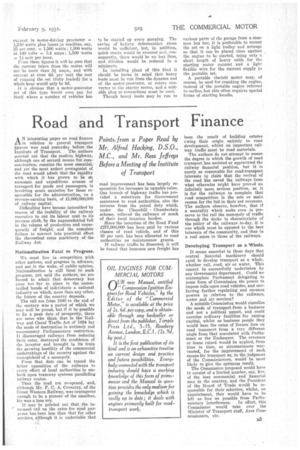Road and Transport Finance
Page 37

If you've noticed an error in this article please click here to report it so we can fix it.
Points, from a Paper Read by Mr. Alfred Hacking, D.S .0., M.C., and Mr. Rees Jeffreys Before a Meeting of the Institute of Transport
AN interesting paper on road finance in relation to general transport finance was read yesterday before the Institute of Transport. The authors pointed opt that the modern highway, although one of several means for communication, remains the most essential, and yet the most ardent protagonist of the road would admit that the rapidity with which it has grown to be an economic and expeditious avenue of transport for goods and passenger; is involving acute anxieties for those responsible for the administration, on a revenue-earning basis, of 11,000,000,000 of railway capital.
Difficulties have become intensified by reason of the inability of the railway executive to cut its labour coat to its revenue cloth, by the unprecedented fall in the volume of production and consequently of freight, and the complete failure to convert into practical effect the theoretical rates machinery of the Railway Act
Nationalization Fatal to Progress.
We must live in . competition with other nation; and progress in advance, and not in the wake, of public opinion. Nationalization is still fatal to such ,progress, yet, said the authors, we are forced to admit that democracy has gone too far to place in the uncontrolled hands of individuals a national industry on which, more than any other, the future of the country depends.
The rail era from 1840 to the end of the century was a period of which we may well be proud, but if it be possible to fix a peak date of prosperity, there are some who think that in the Railway and Canal Traffic Act of 1894 lay the seeds of destruction in untimely and unnecessary Parliamentary restriction. It discouraged railways from reducing their rates, destroyed the confidence of the investor and brought in its train the growing hostility of the commercial undertakings of the country against the stranglehold of a monopoly.
From that date can be traced the bitter opposition of the railways to every effort of local authorities to eme bark upon tramway systems paralleling railway routes.
Thus the road era re-opened, end, although Mr. F. C. A. Coventry, of. the Great Western Railway, was courageous enough to be a pioneer of the omnibus, his was a lone cry.
It may be pointed out that the in' creased call on the rates for road purposes has been less than that for other services, although it is undeniable that road improvement has been largely responsible for increases in rateable value. One branch of highway traffic has provided a substitute for Government assistance to road authorities, also the revenue from the petrol duty which, under the Churchill Chamberlain scheme, relieved the railways of much of their local taxation burden.
Since the inception of the Road Fund 1277,000,000 has been paid by various classes of road vehicle, and of this 30 per cent. has been allocated to road authorities as maintenance grants.
If railway traffic be dissected, it will be found that immense new freight has been the result of building estates cwing their origin entirely to road development, whilst an important railway traffic must be road materials.
The authors do not attempt to assess the degree to which the growth of road transport has assisted or aggravated the railway financial position, but it is surely as reasonable for road-transport interests to claim that the revival of the road has saved the railways from what otherwise might have proved an infinitely more serious position, as it is for the railways to complain that road competition is the sole or main reason for the fall in their net revenues. The authors observe, however, that if a mentality which seeks even to preserve to the rail the monopoly of traffic through the docks is characteristic of the policy of the railways to-day, it is one which must be opposed to the best interests of the community, and thus in a real sense to those of the railways.
Developing Transport as a 'Whole.
It seems essential in •these days that central financial machinery should exist to develop transport as a whole, whether rail, road, air or water. This cannot be successfully undertaken by any Government department. Could we contemplate Parliament delegating -to some form of Commission the power to impose tolls upon road vehicles, and conferring further regulating and revenue powers in relation to the railways, water and air services?
A suitable Commission would visualize the needs of transport from a business and not a political aspect, and could exercise ordinary facilities for raising capital, whilst as business people they would base the rates of licence fees on road transport from a very different angle from that associated with Parliament or the Exchequer. The revenues or loans raised `would be applied, from time to time, as circumstances warranted, for the improvement of such means for transport as, in the judgment of the Commissioners, would be most likely to give the optimum result. The Commission proposed would have tO consist of a limited number, say, five, of the best commercial and financial men in the country, and the President of the Board of Trade would be responsible for their selection, whilst, on appointment, they would have to be left as free as possible from Parlia mentary interference. In effect, this Commission would take over the Ministry of Transport staff, Area Commissioners, etc.




























































































